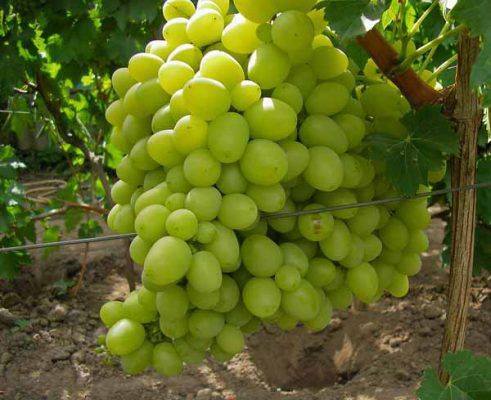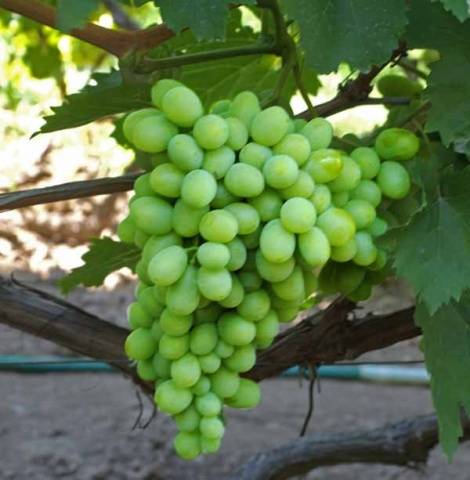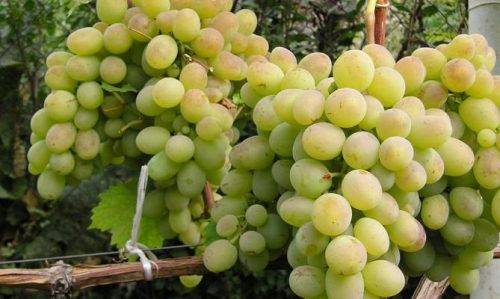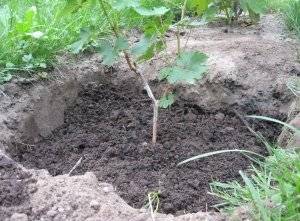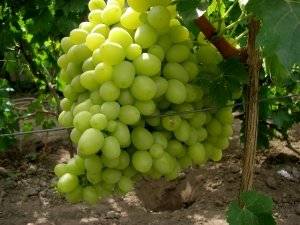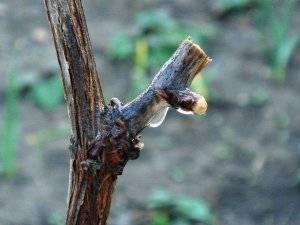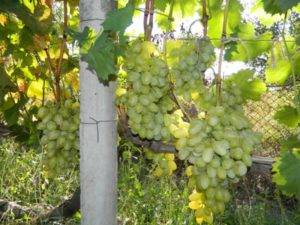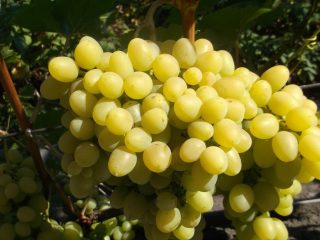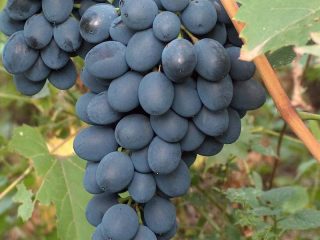Content
The Lancelot variety of Novocherkassk breeders was bred for cultivation in the northern regions. The grapes are resistant to harsh winters. The crop lends itself to storage and transportation. The fruits are of particular value to businessmen. The bunches retain their presentation for a long time and are in demand in the market. A full description of the Lancelot grape variety, photos, reviews, videos, will help you better know the characteristics of the culture, as well as the features of its cultivation.
The main features of the variety
An overview of the description of the Lancelot grape variety should start with the origin. The culture is a hybrid. Received grapes when crossing Gift to Zaporizhzhia, FV-3-1 and Ecstasy varieties. The result of the selection was an early Lancelot hybrid, which yields a crop about 130 days after the buds awakened.
The Lancelot shrub is characterized by a sprawling, strongly growing vine. The flowers are bisexual, which promotes self-pollination. During the season, the vine has time to ripen almost the entire length.
The bunches grow large, conical in shape with densely packed berries. Typically, the average weight of the hand varies from 0.9 to 1.3 kg. Good feeding allows you to increase the weight of the bunch up to 3 kg. The shape of the berries is cylindrical, turning into an oval. The weight of one fruit is about 14 g. The average length of a berry is 31 mm, width is 22 mm. The skin of the Lancelot grape variety is light green and turns white when ripe. The berries are tanned in the sun.
The structure of the flesh is fleshy, the taste is sweet with a moderate presence of acid. When the berry is eaten, a honey aroma is felt. The peel is so strong that it does not crack with strong waterlogging of the soil, however, when chewing the fruit, it is practically not felt.
The Lancelot variety is characterized by a high unlimited yield. To reduce the load on the bush, part of the brushes is removed even before flowering. In winter, Lancelot grapes can withstand frosts down to -24aboutC. The variety is resistant to fungal diseases, but preventive measures must be taken.
The video will help you to recognize the Lancelot grapes better:
Positive and negative qualities of the variety
Finishing considering the description of the Lancelot grape variety, photos, reviews, it is worth taking stock of the positive and negative qualities of the culture. The benefits include:
- excellent taste of berries;
- beautiful presentation of the bunches;
- large brushes, large berries;
- resistance to frost, fungal diseases and pests;
- brushes are able to hang on the vine for a long time, can be stored and transported.
The high density of berries on a bunch can be attributed to the advantages and disadvantages. Due to the dense accumulation of fruits, the Lancelot variety brushes do not wrinkle during transportation. However, the same density prevents the berries inside the bunch from ripening evenly.
Growing secrets
If there is a desire to grow the Lancelot grape variety, then a sunny place is selected for the seedlings on the site. Planting is best done in the fall. Before winter, Lancelot's seedling will gain strength, take root and survive severe frosts. Spring disembarkation is dangerous due to night frosts. Affected young shoots on a seedling may not resume their growth.
However, most gardeners recognize the spring planting of Lancelot grapes because of the 100% survival rate of the seedling. To protect against frost, a film shelter is erected at night. Agrofibre allows air to pass through and you can not remove it from the seedling even during the day. When the period of night cold snaps ends, the shelter is removed.
The autumn planting of Lancelot is carried out in mid-September. The weather should be warm around the clock. When buying planting material, Lancelot grape seedlings are chosen with a length of about 50 cm with ripe buds and a large root. It is important to examine the bark carefully. On the surface there should be no signs of damage in the form of spots, dry areas, places gnawed by pests. In a Lancelot grape seedling, the root system is shortened to 15 cm with scissors, and then immersed in a liquid clay solution.
The plot is prepared long before the grapes are planted. If the procedure is performed in the spring, then the soil and pits are prepared in the fall. When the planting time falls in September, the preparation of the site is carried out at least three months in advance, somewhere in the beginning of summer.
First, all the soil is dug onto the bayonet of the shovel. Remove weed roots, debris, stones. The Lancelot variety is characterized by strong bush growth. For normal development, a gap of 2-3 m is left between the seedlings. The hole is dug with a depth of at least 80 cm. Approximately the same dimensions are kept in width and length. The dug hole is loaded with a nutrient substrate, consisting of:
- 2 buckets of humus;
- 3 buckets of peat;
- 2 kg of ash;
- 150 g of potassium and superphosphate;
- 2-3 buckets of fertile soil.
If the soil is too poor, the amount of organic matter is doubled. At the bottom of the pit, a drainage layer of stones, sand and earth is organized.
Before planting Lancelot grapes, the hole is prepared again. At the bottom, a small elevation in the form of a mound is paved. A seedling with roots soaked in clay is lowered into a hole, sprinkled with earth, lightly tamped with hands, and then poured with a bucket of water. After absorbing the liquid, the loose soil will settle. More earth is added to the hole, and mulch from straw or sawdust is poured on top.
Long shoots of Lancelot seedling are shortened with pruning shears, leaving no more than 4 pieces. Before the onset of frost, the grapes will have time to dissolve roots in the ground and take root.
Care features
The Lancelot variety, like other grapes, requires standard maintenance procedures. From the beginning of April to the end of October, the bushes are regularly watered. The frequency depends on the weather conditions. Water is poured under the root of the grapes. After absorbing the liquid, the soil is loosened with a hoe to avoid crusting. Adding mulch gives good results. Straw, sawdust or peat inhibit the growth of grass, prevent moisture evaporation, and are also a good organic fertilizer.
Mandatory watering of Lancelot grapes is carried out before flowering, as well as during the pouring of berries. 1 m2 land poured at least 50 liters of water. Lack of moisture during this period threatens shedding of inflorescences and ovaries. About 3 weeks before harvesting, watering is completely stopped.
Preparation for wintering Lancelot is similarly not complete without abundant watering. Amount of water per 1 m2 increase to 100 liters. The abundance of moisture makes it possible to stock up on the vine for the winter with useful substances.
Variety Lancelot loves feeding, for which thanks to large bunches. Organic matter is considered the best fertilizer. Gardeners use rotted manure, humus, compost and add wood ash. To increase the sweetness, as well as the size of the berries, help feeding the grapes with mineral fertilizers containing potassium and phosphorus. Young bushes of the Lancelot variety are fertilized monthly. Mature grapes are usually fed early and late in the season.
In good weather conditions, Lancelot's bunches will ripen in early September. The amount of harvest depends on the care and climatic conditions. In the southern regions, up to 10 kg of grapes are harvested from the bush.For the central strip, a yield indicator of up to 7 kg per bush is considered normal.
The Lancelot variety is considered frost-resistant, but in cold regions, the vine is sheltered for the winter. The branches of the grapes are removed from the trellis, tied with a rope, laid on boards or a bed of straw. From above, the vine is covered with dense material and covered with earth.
Before sheltering, the vine must be cut off. Lancelot bushes are vigorous and need to be shaped. The advantage of autumn pruning is that the procedure is less painful. By this time, the sap flow slows down, and the grapes lose less nutrients. In spring, it is better to cut off frozen and damaged shoots.
On young Lancelot bushes 3-4 eyes are left on the lashes. They do not give birth, but are used to form a bush. On adult grapes, sticks with 8 eyes are left. The bush forms from 3 to 8 fruiting arms. The maximum number of eyes on an adult grape is 35. It is not advisable to leave a larger amount. Overloading the bush will only reduce yields and drain the vine.
Disease prevention
A feature of the Lancelot grape variety is its resistance to dangerous diseases: mildew and powdery mildew. However, preventive measures should not be ignored. Before flowering, grape bushes are sprayed with a 1% solution of Bordeaux liquid.
Insects and birds are no less dangerous to ripe berries. The strong skin of the berries makes it difficult for the wasps, but if desired, they can gnaw it. With the appearance of sweet juice, a fly flies along with the wasps. Traps from plastic bottles help to get rid of the enemy. The containers without plugs are hung with ropes from the trellis, and sweet liquid is poured inside. From gluttonous birds, the grapes are covered with nets.
The video provides an overview of Lancelot grapes:
Testimonials
Experienced gardeners and simple summer residents leave a lot of reviews on the forums about Lancelot grapes.
